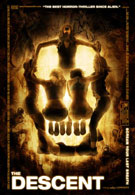Never has my bucket of popcorn looked more interesting than in the last grueling half of Neil Marshall’s unbearably tense and bloody The Descent, a nasty piece of horror filmmaking from across the pond that will do for cave exploration what Jaws did for ocean bathing. An all-female spelunking trip in Appalachia soon goes horribly awry as six friends discover to their dismay that they’re not alone in the murky depths of a previously uncharted cave. Marshall, who won considerable praise in 2002 for his werewolf flick Dog Soldiers, certainly knows his way around the conventions of the genre, and though it treads no new ground, The Descent serves up enough gore and crap-your-pants thrills to satisfy the bloodlust of even the most jaded horror fans.
A seemingly benign opening sequence introduces the adventuresome trio of Sarah (Shauna Macdonald), Juno (Natalie Mendoza), and Beth (Alex Reid), as they wrap up a whitewater rafting run and are greeted by Sarah’s husband and daughter. The trip home, however, brings tragedy in a jarring and gruesome traffic accident that’s too cruel to be believed. The action shifts to a year later somewhere in the North Carolina mountains where the group has gathered for a caving expedition, organized in part to help in the healing process. Bad idea. Especially when we learn that their headstrong leader Juno, in a fit of hubris that inevitably dooms all horror film protagonists, has decided to leave all maps behind and venture into unknown territory. It isn’t long before the gals discover century-old climbing gear and a wall of eerie cave paintings, soon followed by some decidedly ominous noises in the dark.
Early scenes do well to establish both camaraderie and an underlying tension in the group dynamic. We learn that Juno may very well have been involved with Sarah’s husband at some point and that Beth was aware of it, further complicating matters. The best horror films take the time early on to establish characters, so that when the carnage begins it’s all the more horrifying because we actually have an emotional investment in the victims. Marshall succeeds marginally in this and also creates a palpable sense of dread with a couple of unsettling dream sequences. Too often he resorts to the tired cliché of false alarm shock moments, whether it’s a bird or a bat jumping out of the shadows or a friendly face, but it’s a minor complaint in light of the film’s unrelenting final sequences.
The Descent is such a harrowing experience because it’s one of total immersion, often plunging the viewer into a first-person perspective with limited visibility and terrifying results. It’s dark, cramped spaces envelop the characters in a claustrophobic nightmare, heightened by disorienting handheld shots and a booming, shriek-filled soundtrack. When the headlamps go flying and the flares are lost, one character resorts to using the night vision function on a camcorder, which lends immediacy and an uncomfortable proximity to the gruesome proceedings. At one point, the video camera swings around to a shocking reveal that stands out as the film’s signature shot, and it’s a doozy.
Without revealing precisely what’s discovered at the bottom of the cave, I should mention that when things finally do go south, they do so in the worst ways imaginable. Buckets of blood are spilled, including one memorable image that pays loving homage to the final scene of Carrie. Unlike the tongue-in-cheek irony of the Scream franchise or the watered-down PG-13 retreads of superior Japanese shockers that have marked recent horror cinema, Marshall aims simply to scare the bejesus out of audiences with scenes of shocking brutality and mayhem that linger long after the credits roll. The Descent, along with other recent releases like High Tension and Wolf Creek, has helped invigorate a genre once awash in inferior remakes and a timid eye on the bottom line.
Watching this film, at least for me, was a physically exhausting experience, an endurance test of the psyche. I often wonder why I, with a fertile imagination and an innate fear of the Boogeyman, subject myself to this kind of cinematic torture. Why do we revel in the most vile depictions of onscreen carnage? Like riding roller coasters, does it satisfy some primal need for unadulterated terror that we can’t access in our mundane lives? It’s hard to say, but I do know this: I won’t be going spelunking any time in the foreseeable future.











